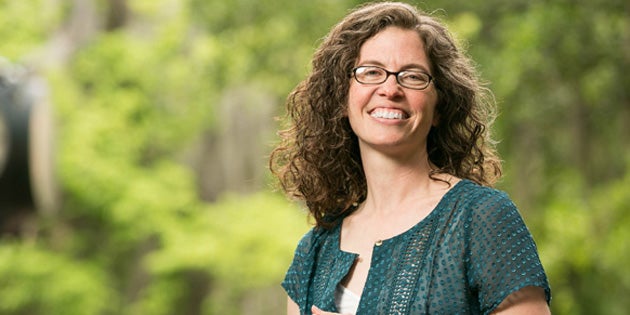“Pushing the boundaries is what college is about.”
College of Charleston women’s and gender studies professor Alison Piepmeier strives for radical progression in her career. She hopes she is a fierce advocate for the inclusion of all students.
It’s why she is one of CHARLIE Magazine’s 50 Most Progressive People of 2014. That means she’s one of the most forward-thinking people making a positive impact on the future of Charleston.
RELATED: Read Piepmeier’s profile in CHARLIE Magazine.
Q: How are you progressive?
A: Progression—even radical progression—is what my career is about. As a professor of women’s and gender studies, examining inequities, understanding power dynamics, and challenging dehumanization are at the center of my scholarly and activist work.
RELATED: Learn more about the women’s and gender studies program.
I’m certainly attempting to be progressive in the world of people with intellectual disabilities. As the CHARLIE article discussed, I’m an advocate—I hope a fierce one—for inclusion of all students and a radical rethinking of what intellectual disability means. This is what my current book is about.
Q: What is something you’re passionate about right now?
A: I spent part of the spring 2014 semester advocating for LGBTQ rights and academic freedom.
RELATED: Read some of Piepmeier’s columns in Charleston City Paper.
One of the things I’m passionately committed to is the value of all my students—the value of all people. Feminism is the effort to eradicate oppression that keeps all people from achieving their full humanity, and I’m using other people’s wisdom and innovations to help make this happen. If any of us take a moment to examine the world in a thoughtful, reflective way, we’ll see so many ways in which we dehumanize people.
The recent example is how many people who were concerned about the homophobia of some of our state legislators said that this will pass, that we’re in a moment of change and in the near future this homophobia will be history. I agree with this, and I find it hopeful. And yet, many of my students, colleagues, staff, friends, babysitters, are being affected by this homophobia—this dehumanization—right now. It’s not acceptable to stop at the recognition that times will change. People are suffering right now, and it’s our job—at least my job—to fight for everyone’s full humanity.
Q: As a professor, why is it important to be thinking of innovations and pushing the boundaries?
A: This is the work I want my students to be able to do: I want them to be critical thinkers, able to examine the world they live in, identify problems, and figure out how to respond (and there are many, many ways to respond).
Pushing the boundaries is what college is about. You don’t come to college to learn to repeat things that other people have said. You come to develop your own thinking skills, to examine your beliefs and be open to change. You come to learn to identify boundaries and to question them. You come to learn to be who you’d like to be for the next step in your life.
Q: What is your big dream? How are you going to push the boundaries next?
A: As I wrote in a City Paper column months ago, I’m ready to be the person who identifies inequity and fights it in ways that might get people’s hackles up. Someone needs to do that work—someone needs to be willing to stand up and announce when things are unjust. It won’t make me popular, which means that we then need some nicer folks to step into the space that I’ve created and make a reasonable argument that suddenly seems like a good idea.
RELATED: Watch Piepmeier speak about Down syndrome and equality at the College’s in!Genius event.
My big dream is for a world where my daughter—who has Down syndrome—will be fully accepted as someone manifesting diversity in a world that’s full of all kinds of diversity. I want a world in which all kinds of human diversity are recognized and celebrated. I’m so grateful to be in women’s and gender studies, because in many ways we’re an academic entity that welcomes people of different genders, sexualities, ethnicities, intellectual abilities, and beliefs. This means that when I’m in my office, I learn a great deal every day.





